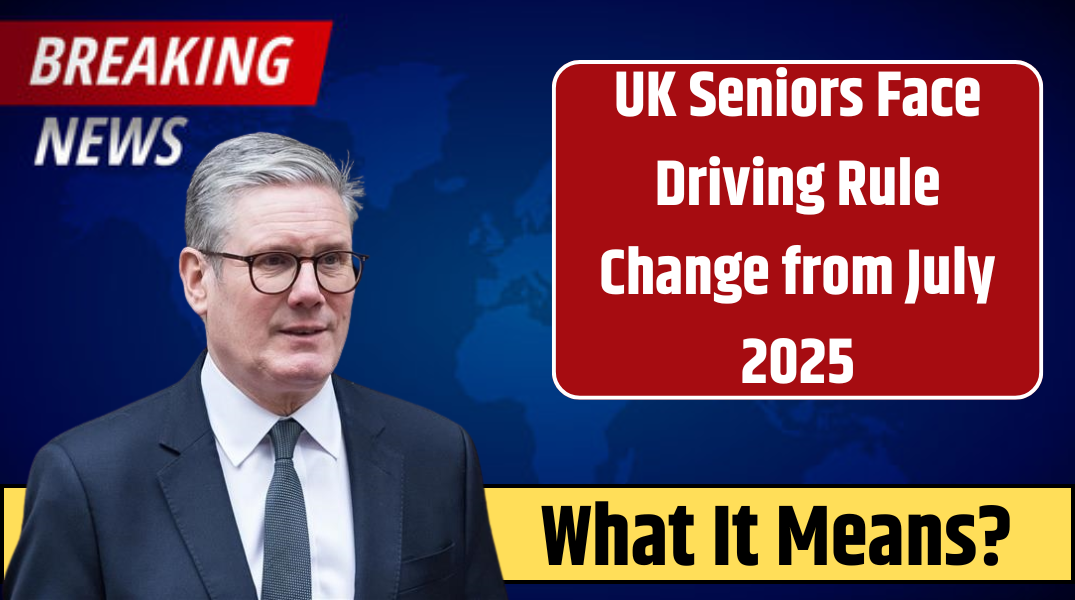Starting July 2025, older drivers in the UK will face new driving licence renewal rules designed to strike a balance between road safety and personal independence. While the familiar three-year renewal at age 70 remains, new steps are being introduced to ensure drivers remain fit behind the wheel. These include more rigorous health checks, medical certifications, and—when necessary—vision or cognitive testing.
The updates come amid increasing concerns about age-related health risks such as memory loss, slower reaction times, and deteriorating eyesight, all of which can contribute to driving accidents. With over six million UK drivers aged 70 or older, these changes aim to protect both senior drivers and other road users.
🚦 What’s Changing from July 2025?
| Key Area | New Rules (Effective July 2025) |
|---|---|
| Renewal Frequency | Every 3 years (no change) |
| First Renewal Age | Age 70 |
| Medical Proof | May need GP-signed medical certificate |
| Vision & Cognitive Testing | For high-risk drivers or if flagged by DVLA |
| Random DVLA Screenings | Random health assessments possible |
| Possible Restrictions | E.g., daytime-only driving, short distances |
Detailed Breakdown of the 2025 Licence Changes for Seniors
1️⃣ Medical Certification May Now Be Required
Previously, drivers over 70 could simply self-declare they were healthy enough to drive. From July 2025 onward, some applicants may need to provide formal medical confirmation from their GP to verify their physical and mental fitness to hold a driving licence.
2️⃣ Vision and Cognitive Testing for Some
Drivers with a history of medical concerns (such as dementia, Parkinson’s disease, strokes, or severe diabetes) could be asked to undergo additional vision tests and cognitive assessments. This ensures drivers can respond quickly and make sound decisions on the road.
3️⃣ Random Health Reviews Even If You’re Healthy
Even if you haven’t disclosed a medical condition, the DVLA reserves the right to conduct random health screenings. This proactive approach aims to catch underlying issues that might otherwise go unnoticed.
4️⃣ Renewal Frequency Remains the Same, Process Gets Stricter
You’ll still need to renew your licence every three years after age 70. However, expect the process to take longer if medical documentation or assessments are required.
How the DVLA Will Evaluate Fitness to Drive
-
Medical Evidence: Chronic conditions may require supporting documents from your GP or a specialist.
-
Screening Tests: Vision and cognitive assessments may apply to high-risk individuals.
-
Possible Restrictions: Some seniors may receive conditional licences (e.g., daylight-only driving).
-
Appeals Process: If denied renewal or given restrictions, you can contest with further medical proof or take a driving assessment.
📅 How Renewal Works from 2025
-
At Age 70: First renewal required. Subsequent renewals every 3 years.
-
Submit Application: Online or postal submission.
-
Provide Medical Documents (If Requested): GP notes, optician reports, or specialist assessments.
-
DVLA Review: They may request further tests or paperwork.
-
Receive Licence: Once approved, you’ll receive a new three-year licence. Restrictions may apply depending on health findings.
🛡 How to Prepare in Advance
-
Book Health Appointments Early: Schedule GP visits and eye exams months ahead.
-
Stay Informed: Monitor DVLA updates via www.gov.uk.
-
Be Honest About Health: Monitor changes and inform the DVLA promptly.
-
Plan with Family: Let loved ones help with paperwork or attend appointments if needed.
These new rules aren’t intended to discourage older drivers but rather ensure that they can safely enjoy independence without putting themselves or others at risk.
FAQs About UK Senior Driving Licence Changes in 2025
1. Is this a move to phase older drivers off the road?
No. The changes focus on safety, not ageism. They ensure senior drivers stay fit to drive while respecting their right to independence.
2. Are the medical checks free?
Not necessarily. Some GP letters or tests may carry a fee, so check with your surgery in advance.
3. Will these changes impact my insurance costs?
Potentially. If your licence includes restrictions (like daylight-only driving), it could influence your insurance premiums. Speak with your provider for clarification.
4. Will failing a vision test mean an automatic licence loss?
Not always. You may be allowed to correct issues (like updating glasses) before the DVLA makes a final decision.
5. Can I contest a decision if I’m denied renewal?
Yes. There’s a clear appeals process, which may include further medical evidence or an independent driving assessment.
6. Will the renewal process take longer now?
If medical checks are involved, expect delays. Applying early is highly recommended.
7. Are there alternatives for those no longer able to drive?
Local councils and charities often provide community transport or reduced fares on public transit for seniors who give up driving.
8. Why is this happening now?
With the number of older drivers on the rise, these updates aim to prevent accidents before they happen and reflect lessons learned from recent road safety studies.
Final Thought: It’s About Safety, Not Age
These new rules aim to give peace of mind to drivers, families, and other road users. If you’re proactive about your health and stay informed, the 2025 renewal shouldn’t be stressful. Ultimately, this is about keeping you safely on the road for as long as possible — with confidence and clarity.





